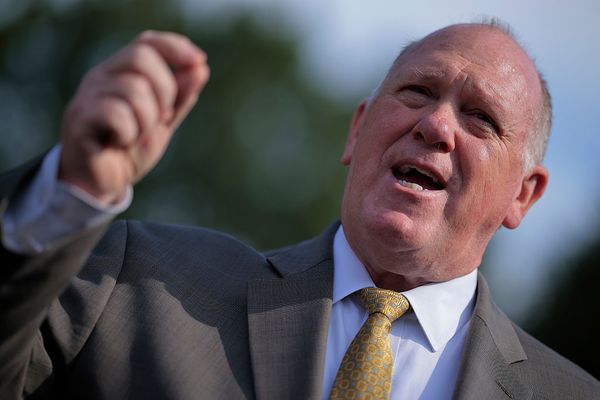
It may seem like a harsh assessment of human nature, but people don’t generally do the right thing simply because it’s the right thing to do, says Natalie Gillard, who has worked in diversity, equity, and inclusion for over a decade. That’s why laws and mandates exist.
And that’s why Gillard has been anxiously watching the Supreme Court. While the ruling had not come down when this issue went to press, court watchers say the conservative majority is very likely to strike down or severely restrict race-based college admissions programs in June. Many fear that prohibiting the use of race as a factor in college admissions will unleash a legal dismantling of over half a century’s worth of laws and rulings aimed at remedying the systemic inequities racial minorities face in the U.S.
The Supreme Court heard arguments in October in the case brought by Students for Fair Admissions, an organization founded by the anti-affirmative-action legal activist Edward Blum, against Harvard University and the University of North Carolina at Chapel Hill, accusing the institutions of discriminating against Asian American and white applicants.
While this decision on affirmative action will most directly affect higher education admissions, legal analysts say it could open the floodgates to upending diversity initiatives in other areas, including the corporate landscape.
And Gillard and her colleagues in DEI are bracing for a crisis. Gillard created Factuality, a 90-minute interactive game and “crash course” in structural inequality that has been used as an employee-training tool at companies such as Google, Nike, and American Express, as well as at Yale University, among others. Factuality has seen an uptick in demand in recent years, but Gillard is under no illusions about why companies hire her: “I really feel that there are people who participate in these programs and initiatives because it’s required and mandatory,” she tells Fortune, “and that with this decision they’re just emboldened to stop.”
Last year the Supreme Court’s landmark ruling overturning Roe v. Wade, which eliminated the constitutional right to abortion, had a transformative cultural and legal effect—leading to a cascade of states passing near-total abortion bans and restrictions on reproductive rights. The affirmative action ruling may not be as far-reaching, but it is a bellwether for a shift in the conversation about race and racism broadly, says Richard Leong, a senior strategist at Collective, a DEI consultancy headquartered in Brooklyn.
“I think it really begins to throw into jeopardy whether or not we can continue to use race and ethnicity as a demographic identifier,” Leong says, adding, “The DEI industry as it is today is already under fire.”
Indeed, DEI initiatives at public universities have been challenged in Florida and Texas this year. Corporate DEI programs have been the target of rage and ridicule in op-eds from the New York Times to the Wall Street Journal. And amid a wave of layoffs, many tech companies are rolling back their diversity pledges, cutting DEI roles at disproportionate rates.
Gillard says she has already seen the effects in her business: She used to collaborate often with companies and organizations in Texas and Florida, she tells Fortune, but she no longer works in those states because organizations are unsure about what they can and cannot do, and fearful of causing controversy.
“I’m concerned the decision will only further curtail our efforts,” Gillard says. “After this you’ll really be able to identify who has always been on board and who never really was.”
A ripple effect
Legal experts say that if the Supreme Court decision goes as expected, it could have a ripple effect on corporate diversity programs. The decision could “augur where the court might go with respect to certain programs for private employers,” says Kevin Cloutier, a partner in the law firm Sheppard Mullin’s labor and employment and business trial practice groups. The courts may rule to strike down affirmative action programs for federal contractors, or be more receptive to reverse discrimination claims against private companies
The most direct impact of the Supreme Court prohibiting race-based admissions decisions is that universities will very likely become less diverse over time—as has happened in public university systems in states where affirmative action is already banned. If so, companies will be left with a more homogenous talent pool to recruit from.
And there are likely to be knock-on effects for companies, says Camille Bryant, an attorney and member of the labor and employment practice group at McGlinchey Stafford. It may be harder to live up to the ESG commitments that companies have made to investors, for example. And less diverse workforces may turn off customers, who increasingly expect brands to be inclusive. More homogenous workplaces are also less appealing to millennial and Gen Z workers, who have high expectations of workforce diversity.
“After this you’ll really be able to identify who has always been on board and who never really was.”
Natalie Gillard, creator, Factuality
Less diverse talent pipelines could have a substantial effect on outcomes at some organizations. A recent study found, for example, that a higher prevalence of Black doctors led to lower mortality rates among Black residents in those counties. But with less diverse medical programs, hospitals will likely employ fewer Black doctors, negatively impacting patient care.
Backlash to the backlash
The Supreme Court case comes at a critical time for the field of diversity, equity, and inclusion. It has been three years since the murder of George Floyd brought about a reckoning on racism in the summer of 2020, and many Black and brown workers remain skeptical of their companies’ lip service to the ideals of diversity, dismissing them as “performative allyship.”
“DEI is a journey, not a destination,” says Ericka Brownlee-Keller, DEI head at a renewable energy company. “It really depends on the fabric and culture of the company you’re in.”
BlackRock is one company that decided to take a hard look at its own record, and the results were revealing. In March 2022, the asset management firm hired a third-party law firm to audit the progress it had and hadn’t made on its multiyear racial equity plans, launched in 2021. The audit found that BlackRock was adhering to the letter of its diversity goals—increasing Black and Latinx hires by 30% and improving representation at senior levels—but was failing in some respects when it comes to the spirit of those goals. It has struggled, for example, to retain its Black and brown employees.
BlackRock is also an early case study of a trend DEI professionals say is growing, and the Supreme Court decision could accelerate: backlash to perceived “wokeness.”
21%
Percentage of companies that have a senior role fully dedicated to DEI. Source: Paradigm's State of Data-Driven DEO, 2022
In April, the conservative group America First Legal (founded by former Trump administration official Stephen Miller) said it had filed a complaint with the U.S. Equal Employment Opportunity Commission requesting a civil rights investigation into whether the BlackRock Founders Scholarship, an internship for minority students, discriminates against students who don’t qualify as minorities.
Incidents like that are why DEI professionals Fortune spoke with don’t believe it’s overblown to see the looming Supreme Court decision as a time bomb. They’ve kept tabs on the responses to the court overturning Roe v. Wade last year, and watched as state legislators quickly moved to severely restrict or ban abortions in the wake of the decision. They’ve braced themselves as anti-LGBTQ cultural narratives have gathered steam in recent years, leading to new state laws restricting access to gender-affirming care and accommodations. And they’ve watched as bans have throttled discussion of sexual orientation and Black history in schools.
“What we’re seeing is in a lot of ways a backlash to us being able to have made so much progress,” says Brownlee-Keller. “We often talk about ‘When’s the other shoe gonna drop?’ A lot of this is people’s fears being realized.”
Some argue that diversity initiatives won’t completely crumble on the heels of the Supreme Court’s decision, that the field has come too far and the people doing the work are too committed. “This might hinder the progress we’ve made in DEI, but I think we’ll find other avenues,” Brownlee-Keller says. “People in these roles are resilient.”
Strategize now
Many DEI professionals are coming up with lists of actions for employers to consider, no matter how the Supreme Court rules. The first is to review DEI programs and ensure the company has a robust and evidence-based case for these initiatives, says Evelyn Carter, a social psychologist and president of the diversity and inclusion consulting firm Paradigm.
For example, a company may discover that the promotion pipeline for Black leaders falls off at a specific ranking, based on 10 years of company data. If the company determines that it has failed to support this talent for promotions, it might implement a program to address the problem. Using data to explain these moves helps ensure that company initiatives are not “misconstrued as things that are being done because Black folks or folks of color are deficient,” says Carter, “but rather recognizing it as what it is: righting systemic inequities.” It could also help ensure that the program would survive a legal challenge.
It’s crucial, too, for companies to diligently vet public statements related to diversity initiatives. For example, in today’s climate, making public promises that a company’s board will be 25% female could create a legal vulnerability, Bryant, the McGlinchey Stafford lawyer, says. “Sometimes messages that are very well intended can get an organization in hot water if it’s not necessarily done and crafted in the right way.”
75%
Percentage of employees who don't think their organization's racial equity policies are genuine. Source: Catalyst Survey, 2022
That’s a lesson several of Carter’s clients learned last year after announcing plans to pay for employees’ travel costs if they have to cross state lines to get abortions following the overturning of Roe v. Wade. Instead of just applause, they faced controversy and complaints.
“There were employees who said, ‘This goes against my values, and I am upset that you would be seen as a company supporting abortion,’ ” Carter says. “A lot of clients said, ‘We thought we did the right thing. But now these people are upset.’ ” Developing internal FAQs to respond to questions or complaints from employees will help managers and human resources teams avoid being caught off guard if and when such a controversy erupts.
Creating new pathways for diverse recruitment will also be key, and might include doubling down on partnerships with historically Black colleges and universities and other minority institutions and on sponsorship and mentorship programs, as well as more actively developing the pipeline for diverse talent.
“This is the time to help your DEI team.”
Evelyn Carter, president, Paradigm
Most important, company leaders should ask what their DEI teams need. These often small and under-resourced teams may soon have to respond to an influx of reverse discrimination claims and handle a slew of complex internal and external communications. That might involve training managers to see and address bias and harassment, and training HR to understand how discrimination impacts employee performance.
Employees may also have to navigate more internal strife, microaggressions, and harassment, so companies might consider increasing access to mental health resources such as therapy services and warmlines for employees—free, confidential lines where employees can seek guidance, support, or a listening ear.
“That’s a lot. So this is the time to help your DEI team,” Carter says. “Ask your team what they need, and then deliver on it.”
This article appears in the June/July 2023 issue of Fortune with the headline, “The end of affirmative action?”







